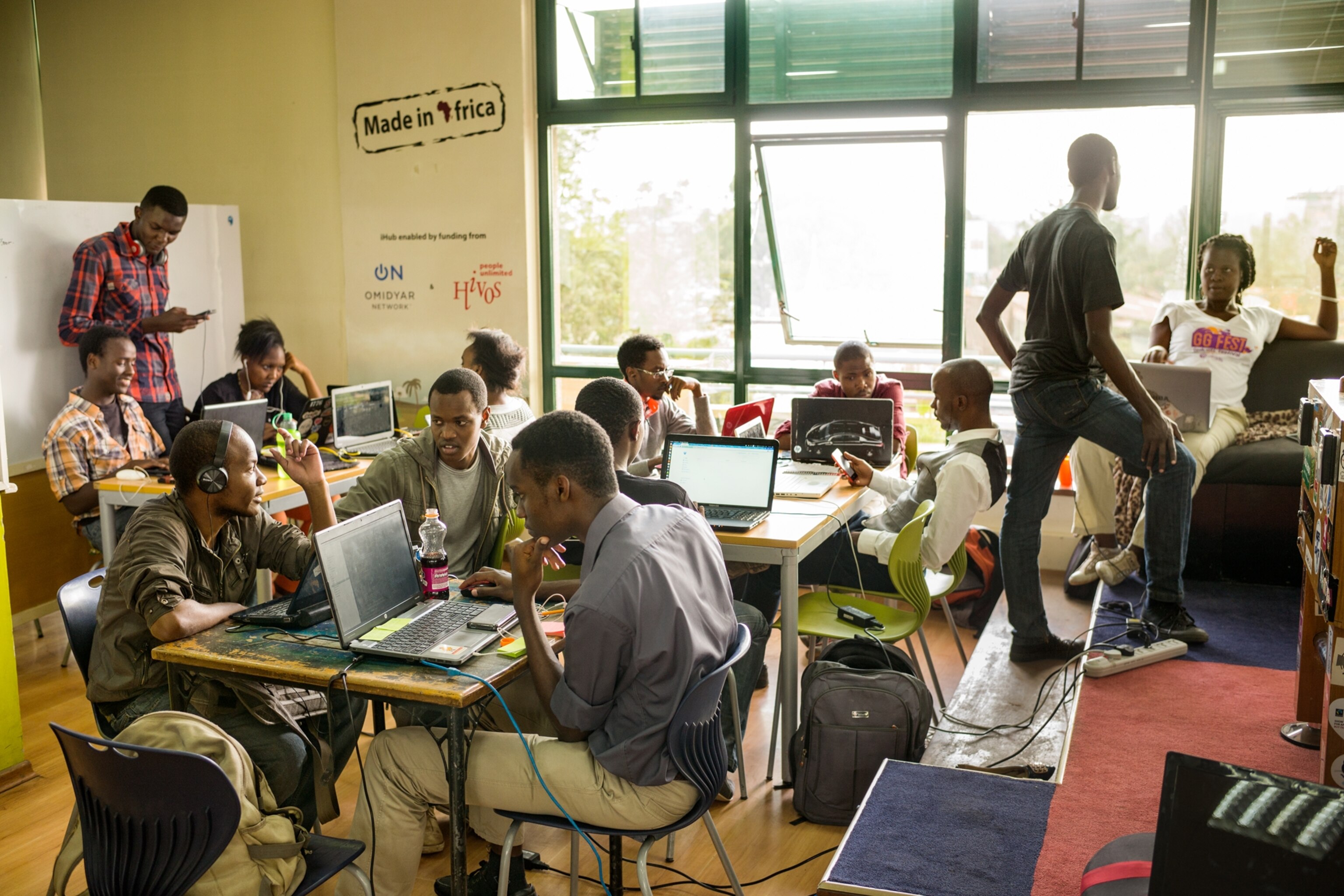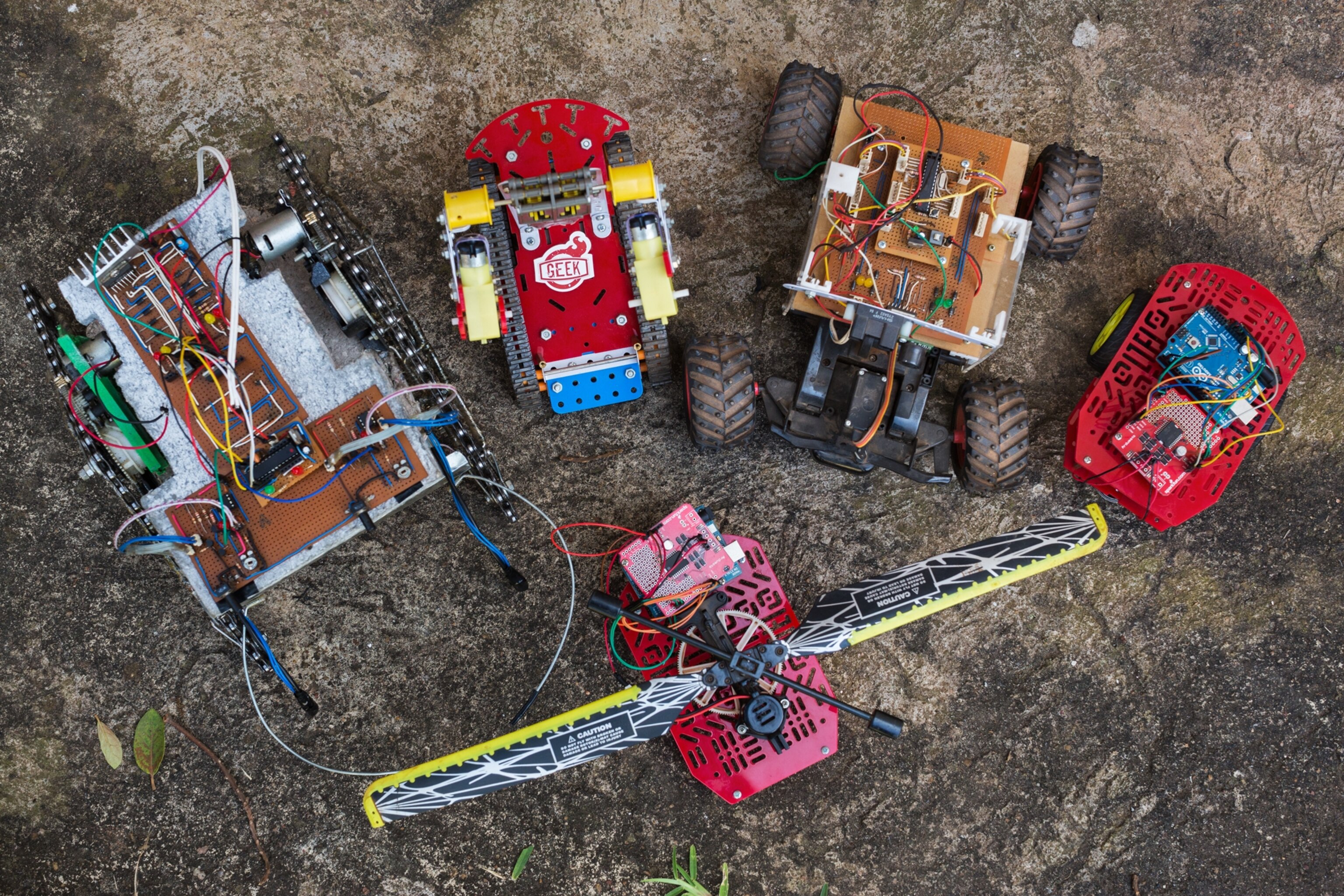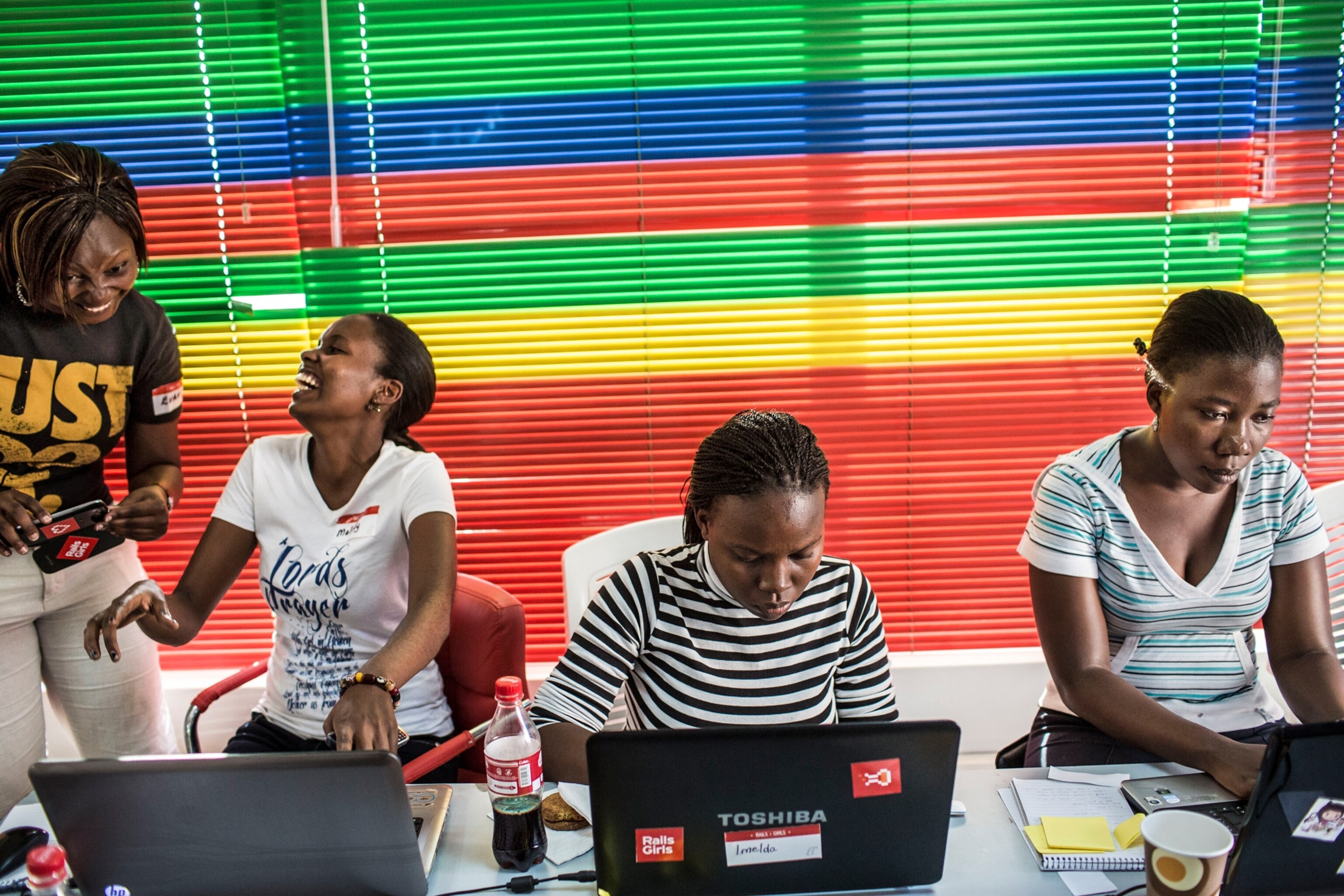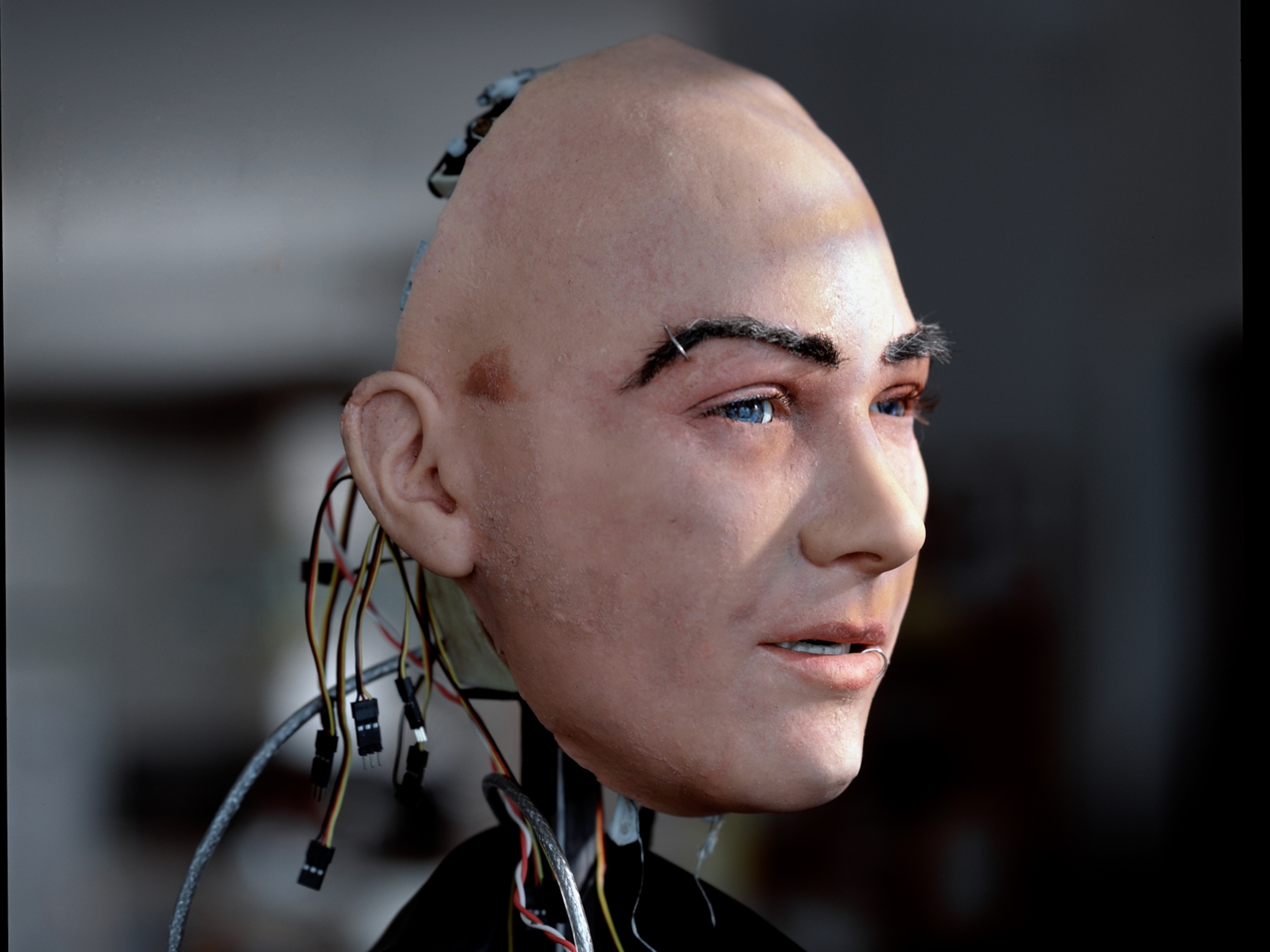One day in 2004, in the Kenyan farming village of Engineer—so named because an Englishman once ran a mechanical repair shop there—a slight and nearsighted boy was walking past the only printing shop when his eyes fell on something he had never seen: a computer.
The boy watched as the owner stabbed at his keyboard. Edging closer, he saw pages spew out of a printer. Standing beside the humming machine, the boy stared mesmerized at the words and numbers that had somehow been transmitted from the computer. Almost a teenager, Peter Kariuki had discovered his destiny.
His parents, subsistence farmers of cabbages and potatoes, began to worry that Peter was spending too much time at the printing shop. No one in Engineer had access to the Internet. Few even had electricity. Tech booms were a faraway notion, and talk of random scrawny, bespectacled kids inventing hardware or writing code and cashing out in their 30s had yet to reach Engineer. Regardless, Peter was hooked. When his superb grades in primary school qualified him to attend the prestigious Maseno School (whose alumni include Barack Obama’s father), a teacher gave Peter the keys to the computer science lab, where he could code all night long.

In 2010 the 18-year-old computer wizard traveled to Kigali, Rwanda. Kariuki got a job designing an automated ticketing system for the capital city’s bus system. Although Kigali was among Africa’s tidiest and most crime-free cities, its transit system was woefully in keeping with the norm on the continent. Because the buses (really just vans) were unreliable, overcrowded, and glacial in velocity, most commuters relied on motorcycle-taxi drivers, who are notoriously reckless. Indeed, throughout sub-Saharan Africa, road accidents are catching up with AIDS and malaria as leading causes of death—and police statistics that Kariuki has seen indicate that in Kigali about 80 percent of road accidents involve motorcycles. These facts riveted Kariuki and his roommate, Barrett Nash, a fellow start-up aspirant from Canada with oversize red-frame glasses. After turning off their laptops for the evening, Kariuki and Nash would stroll through Kigali’s red-light district to an outdoor bar where, over Primus beers, they would wrestle with a basic question: How could they provide Kigali with an Uber-like motorcycle-taxi service that was efficient, affordable, and safe?
Kariuki and Nash described their concept in a video posted on a website used to seek start-up money. An accelerator group founded by an American venture capitalist named Sean O’Sullivan reached them by email and offered them an expenses-paid, three-month mentorship in Cork, Ireland. After determining that it wasn’t a hoax, Kariuki and Nash quit their day jobs. When Kariuki informed his parents, they consoled themselves with the recognition that a 22-year-old had plenty of time to recover from an early failure.
Kariuki and Nash returned to Kigali in spring 2015 with the finalized software for the concept they had dubbed SafeMotos. Rain clouds were gathering as they climbed on motorcycle taxis. Amid the downpour both vehicles raced heedlessly uphill, just as a truck driver ahead of them threw his gears in reverse. Kariuki flew off his motorcycle. He wound up with a broken kneecap, three missing teeth, and a disfigured lip. Later, when the surgeon who fixed his mouth inquired about his misfortune, Kariuki told him that his motorcycle driver had been in a traffic accident.

“I see this all the time,” sighed the doctor as he proceeded to stitch up Kariuki, who managed a smile. His marketing analysis for SafeMotos was now complete.
Today the Rwandan start-up initially funded with $126,000 is the first and largest motorcycle ride–sharing company in Africa. It partners with more than 400 licensed and painstakingly monitored motorcycle-taxi drivers in Kigali, who are likely to make 800,000 trips this year. Gross revenue for 2017 is projected to be $1.1 million. “My dream,” Kariuki told me recently on the rooftop balcony of one of Kigali’s many sparkling new hotels, “is to establish Kigali as our stronghold that no one can touch—and from there move into 10 other cities.”
The pride of Engineer belongs to a wave of digital entrepreneurs who aim to transform sub-Saharan Africa. Their emergence coincides with the ubiquity of mobile phones throughout the continent, as well as the arrival of high-speed Internet—which, as recently as a decade ago, was rare in most of Africa. During the past few years, tens of millions of dollars in venture capital has flowed from the West into such countries as Kenya, Rwanda, Nigeria, and South Africa. The result is a generation of innovators whose homegrown ideas could, in the manner of SafeMotos, improve the lives of their fellow Africans.

This development should not be surprising, despite the many political and socioeconomic travails bedeviling Africa’s overall progress. “On this planet only one continent is growing faster than all the others in population, and it’s likely to keep growing even faster,” says Steve Mutabazi, a chief strategist with the Rwanda Development Board. “I’ve watched Asian countries enviously, and one thing is clear: When you have a developing region with enough members developing an ecosystem, it generates incredible momentum for investment in that region.” Africa, Mutabazi adds, “is at that point now.”

Africa’s late arrival to the digital economy comes with certain competitive advantages. It benefits from advances and mistakes already made by Silicon Valley. Its population is younger than that of any other continent. Its marketplace amounts to a new frontier. Its largely untapped labor force presents an appealing prospect for tech-assembly plants. “Look at how China and India are competing in the electronics market,” says Bitange Ndemo, Kenya’s former permanent secretary at the Ministry of Information and Communications and now a professor of entrepreneurship at the University of Nairobi’s School of Business. “India is well on its way to becoming a global production center for electronic products. And how? By having so many young people with little to do that they can make things for next to nothing. What other continent can do that? Africa.”
It happens that Ndemo was one of the first Kenyans to promote his country’s tech potential with the nickname Silicon Savannah. Today he says the hype is warranted. Thanks to the mobile money-transferring innovation launched in 2007 by Kenya’s M-Pesa, Africans with a cell phone can deposit and withdraw cash at many shops without having to visit a bank or ATM. Mobile money transfers also are being used to pay for power from solar panels that off-grid-energy companies install on homes lacking electricity. Uber is a fact of life in urban East Africa, as are homegrown car-sharing competitors.

New technology spreading throughout the region allows residents to buy groceries, clothing, and other goods online. An app called iCow helps herders manage their cattle populations. Another, named Kytabu, makes it possible for students and teachers in underprivileged schools to lease textbooks on mobile devices. However unwelcome economic disadvantage may be, in Africa it has sparked ingenuity. As Michel Bézy, the associate director of Carnegie Mellon University’s Kigali campus, observes, “When you and I need something, we go on Amazon. In the village they have to invent it. I see it with my students. They’re much more creative over here.”
Nevertheless Bézy—who has also worked on campuses in the Democratic Republic of the Congo, Belgium, and North Carolina—is among those who fear that Africa cannot possibly meet the expectations raised by Silicon Savannah boosters. “Having an idea is fine,” he says, but “an idea has no value unless it’s executed.” Skeptics point out that some 60 percent of sub-Saharan Africans do not have access to electricity. Even for those who can find a way to power up a computer, there are limited opportunities for learning how to excel with it. Bézy notes that only eight of the thousand highest rated universities are in Africa (one in Egypt and seven in South Africa), according to Webometrics, which ranks colleges by analyzing data available on the Internet. The effects of such deprivations are apparent throughout African society.
“The awareness of what information technology can do is very, very low in Africa,” Bézy says. “The first time young Africans get computers in their hands is high school. In the U.S. it’s at age four. Company executives here have no idea what IT can do for their companies.”

Knowing how to use their data has been the least of Peter Kariuki and Barrett Nash’s liabilities. Every week the SafeMotos founders email a newsletter to their investors with updated statistics that range from the percentage increase in the number of repeat customers to the safety scores of their drivers. When I visited the SafeMotos office on an unpaved and hilly road west of downtown Kigali, a large computer monitor tracked every trip from start to finish, logging each one for future analysis.
Rather, the challenges facing SafeMotos illustrate the gulf between Africa and Silicon Valley in skilled technicians. “It’s been really hard to find programming talent here,” Kariuki says. “So I have to do everything.”
After interviewing dozens of applicants and concluding that none possessed the requisite skills to assist in continually modifying the SafeMotos app, Kariuki and Nash resorted to hiring a team of three developers based in Poland. Similarly, in the marketing of their invention—to Kigali commuters, to investors, to potential advertisers on the app, to markets outside of Kigali—they are on their own. Their inability to find like-minded visionaries to join the SafeMotos team speaks to long-standing deficiencies in education systems such as Rwanda’s. As Bruce Krogh, the director of Carnegie Mellon’s Kigali campus, says, “The whole experience of children in the U.S., almost from the day they’re born, is: What do you want to do? Education there cultivates critical-thinking skills. Here it’s rote to an extreme. In this culture children are told to stay in their place and not make decisions at all.”

But—as evidenced by the successful effort to lure Carnegie Mellon to Kigali six years ago—Rwanda is rapidly becoming an education success story. When Paul Kagame became president in 2000, he proclaimed that his country would have a knowledge-based economy in two decades. “Most people laughed,” recalls the development board’s Mutabazi. “As recently as 2008 no place outside Kigali had fiber-optic cables. By 2010 the entire country was covered by a network of fiber optics. Twenty years ago the country’s entire higher educated population was 4,000. Now it’s 86,000.”
That progress may not come soon enough to accommodate Kariuki’s timetable. Still, Kigali—the largest city in a country that, 23 years ago, was reeling from a genocide that killed 800,000 of its citizens—has become a hospitable incubator for innovations like SafeMotos. It is small, relatively free of corruption, and in a country with a highly proactive national government—different in nearly every way from Kariuki’s native country of Kenya, where, he says, “people succeed by hustling, knowing that the bureaucrats won’t help them.”
In another Kenyan farming village about 200 miles by road from Peter Kariuki’s birthplace, a child named Peris Bosire would sit in a field while her mother harvested maize and would strain to imagine any other sort of life. Everyone she met in Kebuse was a farmer, or a teacher who educated future farmers. Few made any money. The rough roads made it laborious for them to get their crops to market. They simply consumed what they grew and remained trapped in the village’s primitive sameness.
But Bosire’s fate took a turn at age 10, when her parents sent her to a modest boarding school so that she would not have to make the three-mile round-trip walk to class anymore. Someone had donated seven used Dell desktop computers. The girl’s eyes were uncomprehending when she first beheld them. She’d never so much as seen a cell phone. She had no idea how to type. But she was uncommonly intelligent, and before long she understood what those computers represented: Peris Bosire’s ticket out of the village.
As with Kariuki, Bosire’s grades qualified her for a superior high school, with a bona fide computer lab. She won a national science competition and a scholarship to the University of Nairobi. Her dorm roommate, Rita Kimani, was also from a poor farming community and had a similar way with computers. Bosire and Kimani became inseparable and a nearly unbeatable team on the tech-contest circuit. In mulling over their future, Bosire recalls, “we started looking back at how we grew up and how our parents did farming. And we realized that none of them had ever received a loan to improve their farming activities.”
In spring 2014 the two friends began spending their free time interviewing farmers and bankers. While two-thirds of Kenya’s workforce is in the agricultural sector, less than one percent of commercial loans in Africa go to farmers. If Bosire and Kimani could convince risk-averse bankers that farmers are capable of using mobile phones to keep financial records and make loan payments, then the two women felt confident they could devise a digital bridge between the financial sector and a vast, untapped, and needy customer base.
Bosire and Kimani launched FarmDrive in May 2015. The digital recordkeeping platform serves as a basis for bankers to establish credit ratings and determine which farmers are best suited for small loans. FarmDrive’s pilot program consisted of 50 farmers. Today hundreds of thousands are in FarmDrive’s database; about 830 have received financing. In turn the banks pay FarmDrive for essentially functioning as their credit bureau for Kenya’s vast farming community. The two entrepreneurs have no intention of stopping there. “There are more than five million small farmers in Kenya,” Bosire says. “Throughout Africa it’s about 50 million. But when we started FarmDrive, we always had global ambitions. We’re building solutions for farmers in Asia too.”

In many ways the impulses driving Peris Bosire and Rita Kimani exemplify the best of Kenya’s digital scene: They’re motivated by a desire to better their communities. Even as they now tour the world speaking at business summits and scoping out other market opportunities, they remain rooted in Kenya. Although they come from impoverished villages, they’ve benefited in a broad sense from a heightened innovative streak that, for a host of historical and cultural reasons, seems endemic to Kenya. One distinction is that after Great Britain’s colonial rule ended, Kenya avoided missteps committed by other African nations. As Ndemo points out, “Since independence Kenya has been a free market economy, where a lot of other countries leaned towards the Soviet Union and experimented with socialism. Uganda had a bad experience with Idi Amin. Rwanda obviously had a very bad experience. In the meantime Kenyans have had more than 50 years of freedom.”
But if it’s true that Kenya’s relative stability has contributed to Bosire and Kimani’s success, it’s also true—and typical of the Kenyan entrepreneurial experience—that FarmDrive has succeeded with little encouragement from the national government. In sub-Saharan Africa, Kenya and Nigeria have achieved tech preeminence more from venture capital flowing into those large countries than from government action.
“Right now there is no link in Kenya between policymaking, academic research, and the private sector—and only the government can forge that link,” says Ndemo, who was among the first champions of a 5,000-acre technology hub under construction in Konza, about 40 miles from Nairobi, the capital. It was billed as Africa’s first “smart city” at its groundbreaking in 2013, but its construction has been hamstrung by political squabbling and profiteering. As Ndemo understatedly puts it, “The speed is not there.”
For now Kenya’s version of Silicon Valley is Nairobi’s Kilimani neighborhood, in particular a heavily trafficked, ramshackle thoroughfare known as Ngong Road. One catalyst was the influential technology-innovation center iHub, from which a number of homegrown software start-ups have been hatched—among them Totohealth, which helps parents track the health of their babies from pregnancy through early childhood. The University of Nairobi’s Kenya Science Campus is situated on Ngong. Across the street is 88mph, a prominent firm that invests in tech start-ups. And not far from iHub’s location is FarmDrive’s office, quietly positioned in the epicenter of the city’s programming community.

Another factor binds Bosire and Kimani to entrepreneurs throughout the city and indeed the continent: In succeeding, they inevitably encounter cultural obligations that can inhibit further success. The mythic start-up stories of Steve Jobs building the first Apples in his parents’ garage and of Bill Gates dropping out of Harvard to start Microsoft might be celebrated in the West, but the stakes for brazen risktakers are different in developing countries. “This is the reality of entrepreneurship in Africa,” Bézy says. “You’re the only educated person in a community of 200 relatives. You’re expected to feed that entire family. And in that way your great idea is constrained.”
Bézy’s observation was on my mind as I accompanied Bosire one afternoon on a drive south from Nairobi so that she could learn how a few farming communities were making use of the loans supplied to them via FarmDrive. Their reports were varied. One farmer had used a $200 loan to expand her well-tended acreage of cabbages and was now ready to apply for a second loan. Another woman who raised pigs had constructed a sturdy water tank for her animals. Some farmers had fared less well. One had encountered family hardships and was struggling to pay back his loan. Another had misused the bank’s money on a quick-fix irrigation ditch that had collapsed with the first hard rain. For FarmDrive’s purposes the failures were as useful as the successes. Together they would present a more complete database that would help banks determine lines of credit. Ultimately every farming community in Kenya could benefit from Bosire’s research—including Kebuse, the village where she was raised. But that wasn’t yet obvious back home, as Bosire acknowledged to me when I asked her about the communal pressures on African entrepreneurs. Sighing, the 25-year-old woman said, “My mom and I are having a big fight right now. She doesn’t get it. ‘Why aren’t you sending more money back home? Why don’t you have jobs to give to your cousins?’ ”

Perhaps Bosire’s mother will see things in a more appreciative light once FarmDrive comes to her village. “We Africans sometimes resist change,” admits Patrick Wakaba Kariuki, the father of the SafeMotos co-inventor. He had been fretful when his son decided not to attend college in Nairobi to become an entrepreneur. But last year he flew to Rwanda to visit his son. The farmer marveled at Kigali’s clean streets. It was evident to him that a young man could do business there. And when he climbed onto the back of one of the motorcycles in his son’s fleet, strapped on a helmet, and took off, he found himself gliding through more than time and space. He was departing the simple, predictable ways of the village for an uncharted savanna.
“I was able to understand,” recalls the farmer, who returned to Engineer—where one day, thanks to dreamers aglow at night by computer screens, the future would also come.
You May Also Like
Go Further
Animals
- This ‘saber-toothed’ salmon wasn’t quite what we thoughtThis ‘saber-toothed’ salmon wasn’t quite what we thought
- Why this rhino-zebra friendship makes perfect senseWhy this rhino-zebra friendship makes perfect sense
- When did bioluminescence evolve? It’s older than we thought.When did bioluminescence evolve? It’s older than we thought.
- Soy, skim … spider. Are any of these technically milk?Soy, skim … spider. Are any of these technically milk?
- This pristine piece of the Amazon shows nature’s resilienceThis pristine piece of the Amazon shows nature’s resilience
Environment
- This pristine piece of the Amazon shows nature’s resilienceThis pristine piece of the Amazon shows nature’s resilience
- Listen to 30 years of climate change transformed into haunting musicListen to 30 years of climate change transformed into haunting music
- This ancient society tried to stop El Niño—with child sacrificeThis ancient society tried to stop El Niño—with child sacrifice
- U.S. plans to clean its drinking water. What does that mean?U.S. plans to clean its drinking water. What does that mean?
History & Culture
- Séances at the White House? Why these first ladies turned to the occultSéances at the White House? Why these first ladies turned to the occult
- Gambling is everywhere now. When is that a problem?Gambling is everywhere now. When is that a problem?
- Beauty is pain—at least it was in 17th-century SpainBeauty is pain—at least it was in 17th-century Spain
- The real spies who inspired ‘The Ministry of Ungentlemanly Warfare’The real spies who inspired ‘The Ministry of Ungentlemanly Warfare’
- Heard of Zoroastrianism? The religion still has fervent followersHeard of Zoroastrianism? The religion still has fervent followers
Science
- Here's how astronomers found one of the rarest phenomenons in spaceHere's how astronomers found one of the rarest phenomenons in space
- Not an extrovert or introvert? There’s a word for that.Not an extrovert or introvert? There’s a word for that.
- NASA has a plan to clean up space junk—but is going green enough?NASA has a plan to clean up space junk—but is going green enough?
- Soy, skim … spider. Are any of these technically milk?Soy, skim … spider. Are any of these technically milk?
- Can aspirin help protect against colorectal cancers?Can aspirin help protect against colorectal cancers?
Travel
- What it's like to hike the Camino del Mayab in MexicoWhat it's like to hike the Camino del Mayab in Mexico
- Is this small English town Yorkshire's culinary capital?Is this small English town Yorkshire's culinary capital?
- This chef is taking Indian cuisine in a bold new directionThis chef is taking Indian cuisine in a bold new direction
- Follow in the footsteps of Robin Hood in Sherwood ForestFollow in the footsteps of Robin Hood in Sherwood Forest








